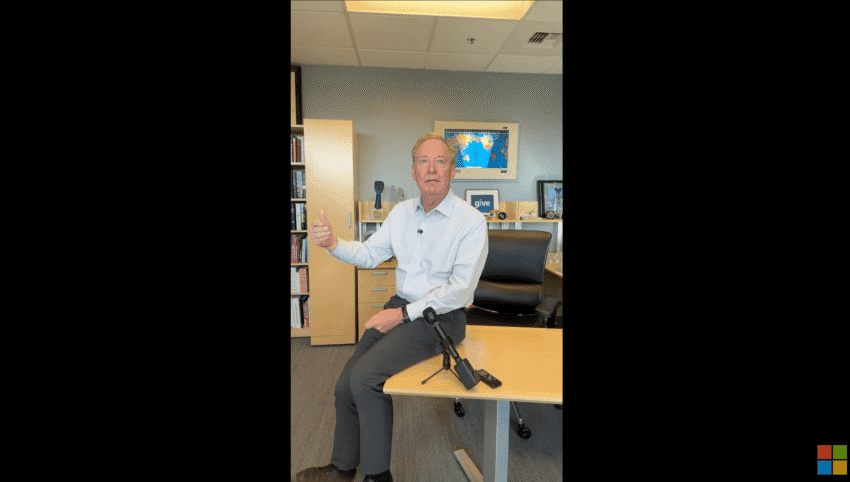

microsoft hosts emergency press conference after protesters storm a building: Microsoft president Brad Smith hosted an emergency press conference on Tuesday afternoon, following an incident in which protesters gained access to a building at the company’s headquarters and conducted a sit-in demonstration inside his office. This unexpected event raised significant concerns regarding corporate accountability and human rights, particularly in relation to Microsoft’s operations in the Middle East.
Key takeaways
- Protesters from the No Azure for Apartheid group occupied Microsoft’s headquarters.
- Brad Smith addressed the media, emphasizing the company’s commitment to human rights.
- The protest was linked to allegations of Microsoft’s Azure platform being used for surveillance in Palestine.
- Smith confirmed an ongoing investigation into the matter.
- Seven individuals were involved in the protest, with two being current Microsoft employees.
The press conference took place just hours after the protesters, affiliated with the No Azure for Apartheid movement, occupied Smith’s office. The group has previously disrupted Microsoft events to advocate for the termination of contracts with the Israeli government and military. During the press conference, Smith appeared visibly shaken, seated on the edge of his desk, as he addressed reporters and a live streaming audience. “Obviously, this was an unusual day,” he remarked, with the camera shaking slightly as he spoke.
The No Azure for Apartheid group has gained attention for its protests against Microsoft’s perceived complicity in human rights violations. The group’s demands center around allegations that Microsoft’s Azure cloud platform is being utilized for surveillance purposes against Palestinians. This has raised serious ethical questions about the role of technology companies in geopolitical conflicts. The protesters’ actions were not isolated; they have interrupted Microsoft’s public presentations on multiple occasions this year, consistently advocating for the company to end its involvement with the Israeli military.
In his remarks, Smith stated that Microsoft is “committed to ensuring its human rights principles and contractual terms of service are upheld in the Middle East.” He acknowledged the gravity of the situation and the scrutiny surrounding the company’s operations in the region. Smith revealed that Microsoft initiated an investigation earlier this month after a report by The Guardian suggested that the Azure platform was being used for surveillance of Palestinian individuals. While he indicated that Microsoft disagreed with some conclusions in the report, he recognized that certain aspects warranted further investigation.
“We are working every day to get to the bottom of what’s going on, and we will,” Smith asserted, emphasizing the company’s dedication to transparency and accountability. This statement reflects a broader trend among tech companies facing increasing pressure to address their roles in global human rights issues, particularly in conflict zones.
The protest was organized by Abdo Mohamed, a representative of the No Azure for Apartheid group. He confirmed that several current and former Microsoft employees participated in the demonstration. Among those identified were Riki Fameli and Anna Hattle, both current employees, as well as former Microsoft staff members Vaniya Agrawal, Hossam Nasr, and Joe Lopez. Their involvement highlights a growing trend of employee activism within major tech companies, where personnel are increasingly willing to publicly challenge corporate policies and practices that conflict with their ethical beliefs.
During the press conference, Smith provided details about the protest, indicating that a total of seven individuals were involved, with two being current Microsoft employees. He stated that the protesters were removed from the premises by Redmond police after they refused to leave when asked. Smith characterized the actions of the protesters as inappropriate, noting that they “stormed a building, occupied an office, locked other people out of the office, [and] planted listening devices.” He described these actions as “not ok,” underscoring the seriousness of the situation and the potential implications for both Microsoft and the individuals involved.
The incident at Microsoft’s headquarters is part of a larger narrative regarding the intersection of technology and human rights. As tech companies increasingly find themselves entangled in global conflicts, the ethical ramifications of their products and services are coming under heightened scrutiny. The growing demand for accountability from both consumers and activists reflects a societal shift towards greater awareness of corporate responsibility in matters of human rights.
In recent years, numerous tech giants have faced similar challenges as they navigate the complexities of operating in politically sensitive environments. Microsoft’s response to the ongoing concerns regarding its Azure platform will likely be closely monitored by both supporters and critics. As the investigation unfolds, the company’s actions may set a precedent for how technology firms engage with issues of human rights and corporate accountability moving forward.
The press conference concluded with Smith reiterating Microsoft’s commitment to addressing the concerns raised by the protesters. He emphasized the importance of dialogue and transparency as the company seeks to navigate the challenges posed by its involvement in the region. As the situation develops, it remains to be seen how Microsoft will respond to the findings of the investigation and whether it will take concrete steps to address the concerns raised by the No Azure for Apartheid group.
The protest and subsequent press conference underscore the growing tension between corporate interests and social activism, particularly in the tech industry. As technology continues to play a pivotal role in global affairs, the demand for ethical practices and corporate responsibility will likely intensify, challenging companies like Microsoft to adapt and respond to the evolving landscape of public expectations.
Source: https://www.theverge.com/microsoft/766429/microsoft-emergency-press-conference-palestine-protest
Was this helpful?
Last Modified: August 27, 2025 at 5:50 am
1 views















